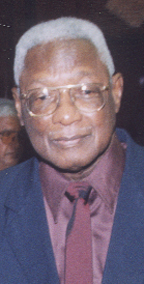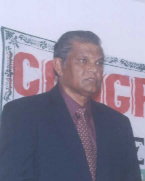The late former President Hugh Desmond Hoyte was on Wednesday remembered as a transformational leader whose substantial contributions included not only facilitating free and fair elections in 1992 but ensuring the peaceful transfer of power after the PNC’s defeat in the election.
The occasion was the fourth H D Hoyte Commemorative Lecture where Major General (rtd) Joe Singh delivered the feature address titled ‘Vision or Pragmatism: The Transformational Role of Hugh Desmond Hoyte, SC’. Singh, who was appointed Chief of Staff of the Guyana Defence Force (GDF) in 1989 by Hoyte, continued to serve in that capacity until his retirement in 2000. He later served as the chairman of the Guyana Elections Commission (Gecom) from June 2000, for the March 2001 elections.

Addressing the gathering at the National Library, which included President Bharrat Jagdeo and several politicians, Singh identified six areas in which Hoyte had a transformational impact on the country.
These were: Undertaking the Georgetown to Lethem Overland Safari in 1973, Instituting the Guyana Prize for Literature in 1987, Launching the Economic Recovery Programme in 1989, Committing to the Iwokrama Rainforest Project in 1989, Facilitating Free and Fair Elections in 1992 and Ensuring the Peaceful Transfer of Power in 1992.
Speaking about Hoyte’s role in the transfer of power, Singh said that after 28 years of PNC rule there was fear that the transition to a PPP/C government would lead to racial disturbances, violence and even a coup. “Such fears did not materialize because Hugh Desmond Hoyte led the way in facilitating a process for the peaceful transfer of power and authority from the PNC to the PPP/C,” Singh said. “This was an act of pragmatism but it also reflected a degree of statesmanship, for which I believe, he has not received enough credit.”
According to Singh, “while there were attempts to derail the electoral process and there was potential for violent upheaval on both sides of the political coin, President Hoyte, no doubt conscious of the presence of the international and regional observers, but also committed to respecting the results of the elections, did not waver even in the face of criticisms from supporters of his party.

“It marked, the commencement of a long-awaited process of reform which to this day is still in need of refinement, based on sustained public advocacy for implementation of already agreed upon, constitutional and electoral and other reforms, and for transparently managed national conversations on the future of Guyana.”
The former Chief of Staff noted that while Hoyte’s decision to facilitate the 1992 free and fair elections, cost him his presidency, “it was a pragmatic and transformational decision that would be the benchmark for ensuring the credibility of the electoral process.” He said the occasion was transformational since it provided opportunities “for embedding democratic principles and practices in the governance of the state and its institutions.” Singh said that “while credit must be given to the sustained advocacy role played by the groundswell of alliances among the political opposition, civil society and overseas supporters, it was President Hoyte who committed to a process that would be subject to local and international scrutiny that would remove the Guyana Defence Force (GDF) from any role in guarding polling stations or escorting ballot boxes.” According to Singh, this “was the commencement of a process to ensure that Guyana’s elections would be conducted in a transparent manner and that the process will respect the election results as the will of the people.”
Singh also saluted Hoyte for his pursuit of the Economic Recovery Programme. The focus of this programme, which was launched in 1989, was macro-economic reform (in particular sourcing external financing, exchange rate devaluation, price deregulation, privatization, and public sector wage control).
“Hoyte was also pragmatic enough to realize too that the ERP had to go hand in hand with other freedoms,” Singh said. “No longer could he remain arrogant, stubborn and unmoved by the agitation of opposition parties, and civil society -including the churches – for freedom of expression and freedom.” He permitted the importation of newsprint and the establishment of a private newspaper; the Stabroek News. He also took action to bring “maverick organisations like the House of Israel to heel,” Singh stated.
Meanwhile, Singh said given the approaching general elections which are traditionally regarded as the “silly season” it would be useful to pay heed to Hoyte’s last speech to his political comrades. Hoyte had urged them to do away with the “sterile polemics” and to concentrate on “the policies to be crafted, the programmes to be designed and the work to be done to stimulate development in the interest of all the Guyanese people.”
Hugh Desmond Hoyte served as President from 1985 to 1992.
He subsequently served as Leader of the Opposition until his death on December 22, 2002, when he succumbed to a heart attack. During the Burnham administration, Hoyte also served as Minister of Home Affairs 1969-1970, Finance Minister 1970-1972, Minister of Works & Communications 1972-1974, Minister of Economic Development 1974-1980, Vice President responsible for Economic Planning, Finance and Regional Development 1980-1985, First Vice President and Prime Minister 1984-1985. The former President was married to Joyce Hoyte who passed away last month.





